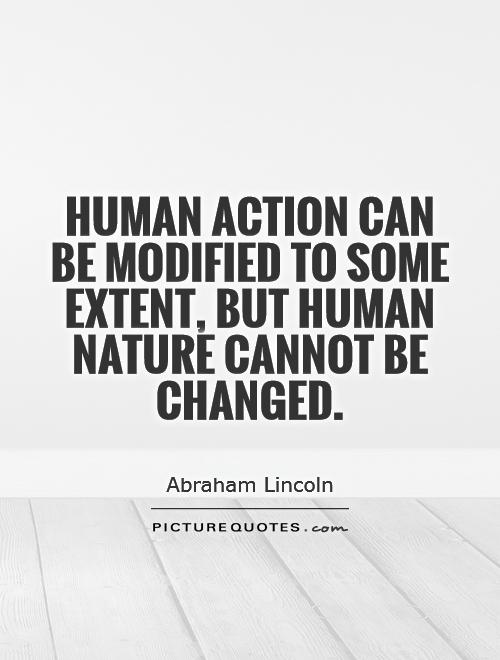Human action can be modified to some extent, but human nature cannot be changed

Human action can be modified to some extent, but human nature cannot be changed
Abraham Lincoln, the 16th President of the United States, is often regarded as one of the greatest leaders in American history. His actions and decisions during his presidency played a crucial role in shaping the nation and ultimately leading to the abolition of slavery. Lincoln's life and legacy serve as a prime example of how human action can be modified to some extent, but human nature cannot be changed.Lincoln's journey from a humble upbringing to the highest office in the land is a testament to the power of individual agency and determination. Despite facing numerous setbacks and challenges throughout his life, Lincoln never wavered in his commitment to his principles and beliefs. His unwavering dedication to the preservation of the Union and the abolition of slavery ultimately led to the Emancipation Proclamation and the eventual passage of the 13th Amendment.
However, while Lincoln's actions as President were instrumental in bringing about significant change, they were ultimately a reflection of his deeply held beliefs and values. Lincoln's commitment to justice, equality, and freedom for all people was rooted in his understanding of human nature and the inherent dignity of every individual. These core beliefs guided his actions and decisions, shaping the course of history in profound ways.
Despite his efforts to bring about change through his actions, Lincoln understood that true transformation must come from within. He recognized that while external circumstances and influences can shape human behavior to some extent, the fundamental nature of humanity remains constant. Lincoln's own struggles with personal loss, adversity, and self-doubt only served to deepen his empathy and compassion for others, reinforcing his belief in the inherent goodness of humanity.












 Friendship Quotes
Friendship Quotes Love Quotes
Love Quotes Life Quotes
Life Quotes Funny Quotes
Funny Quotes Motivational Quotes
Motivational Quotes Inspirational Quotes
Inspirational Quotes